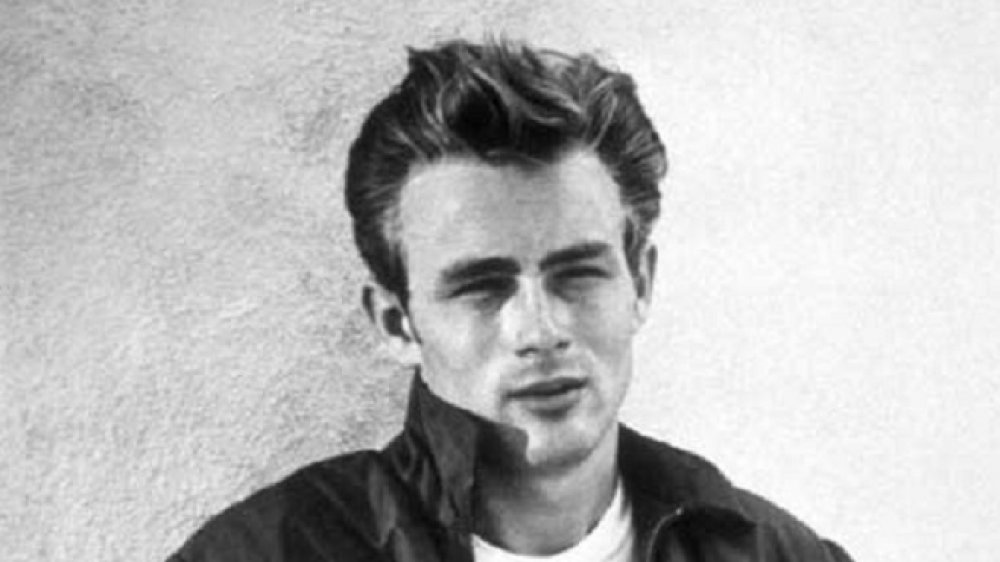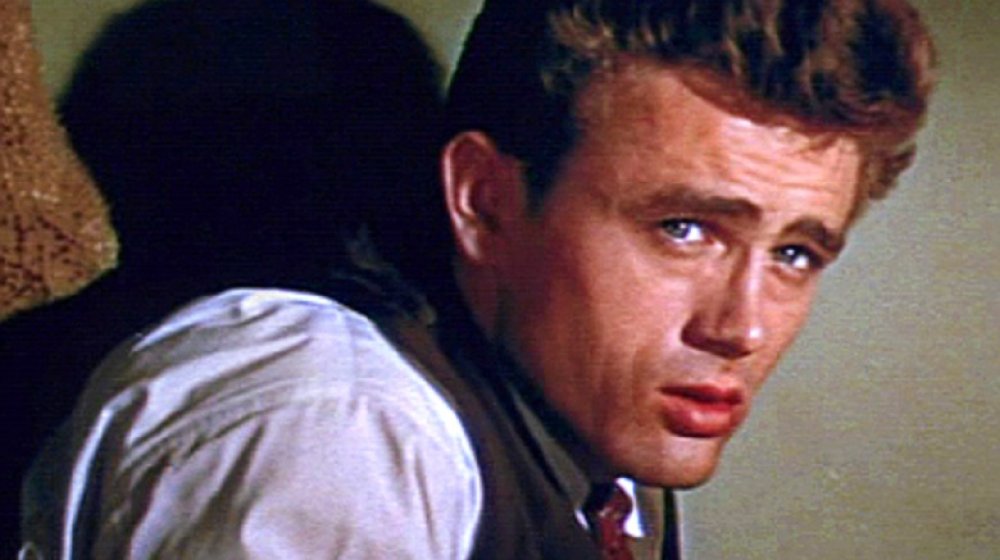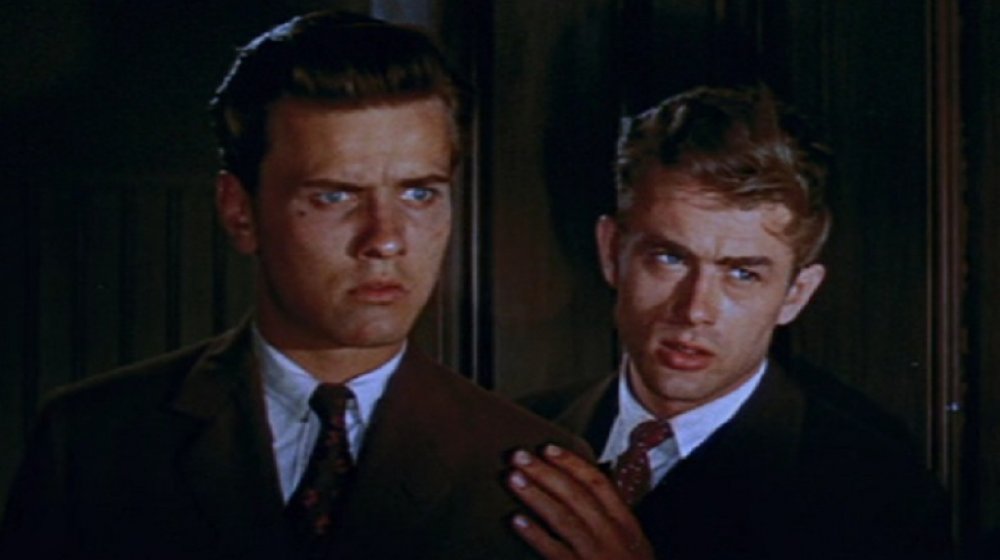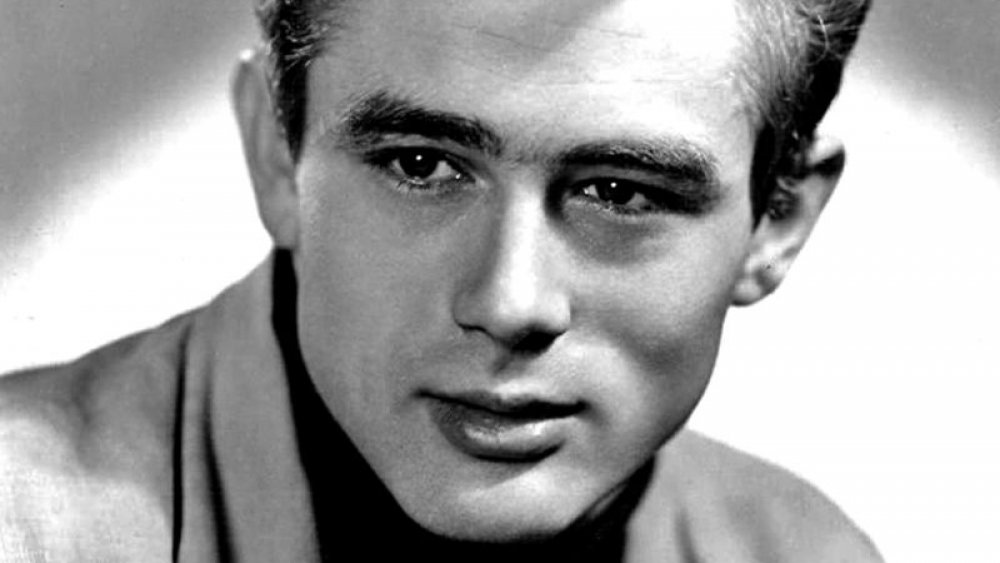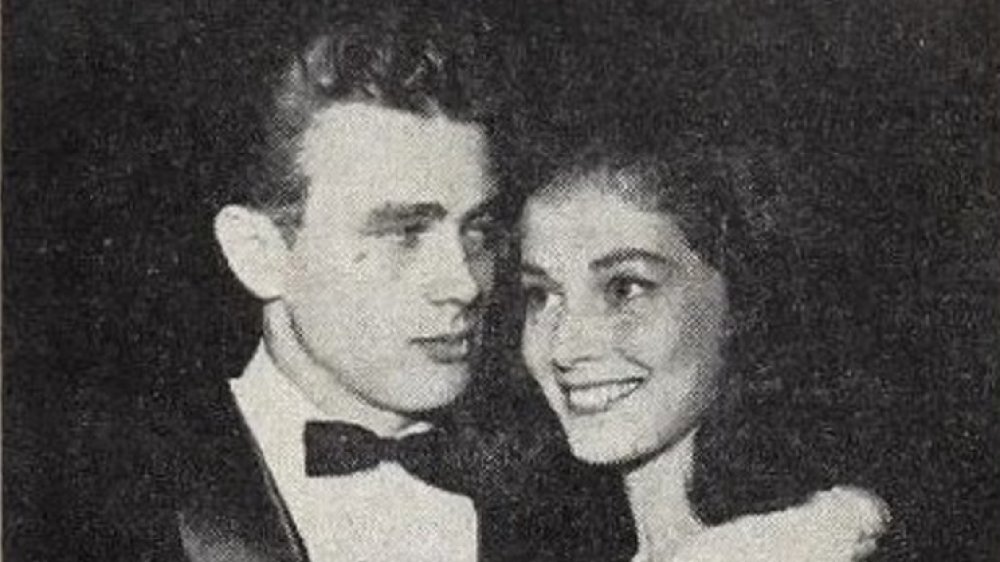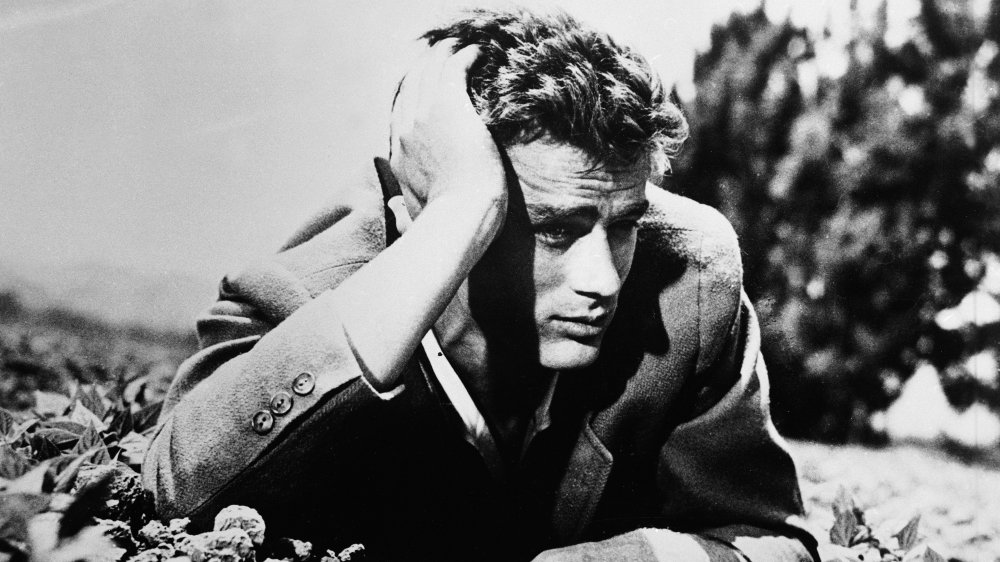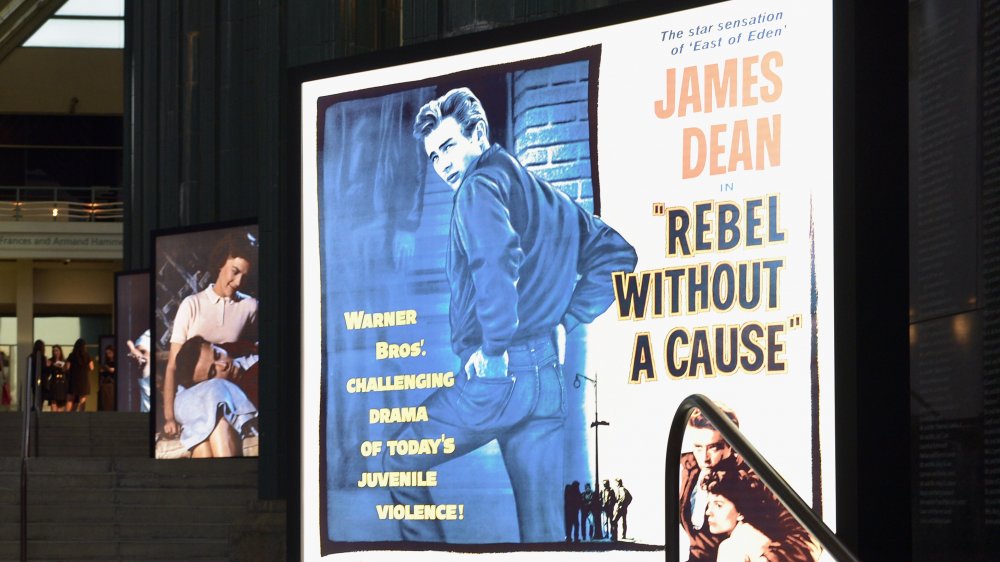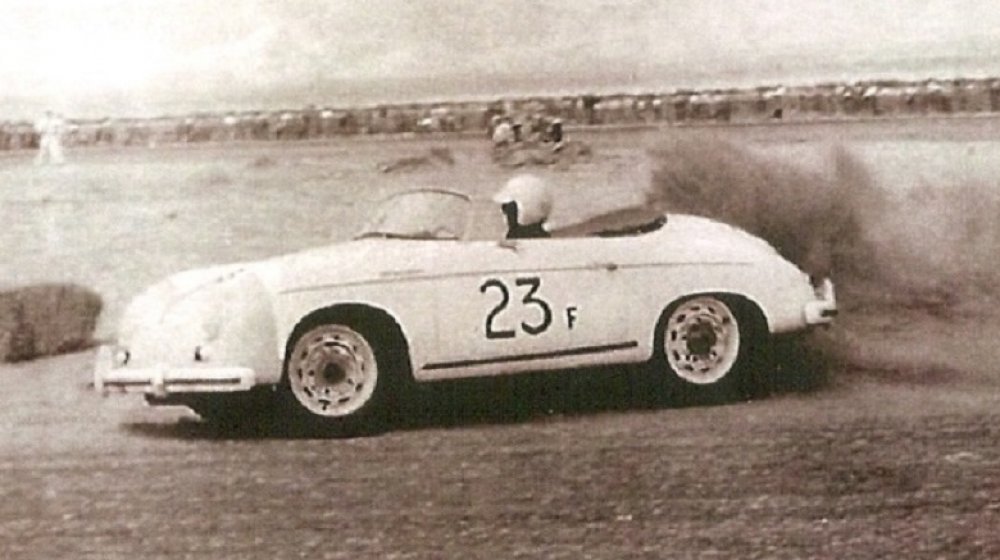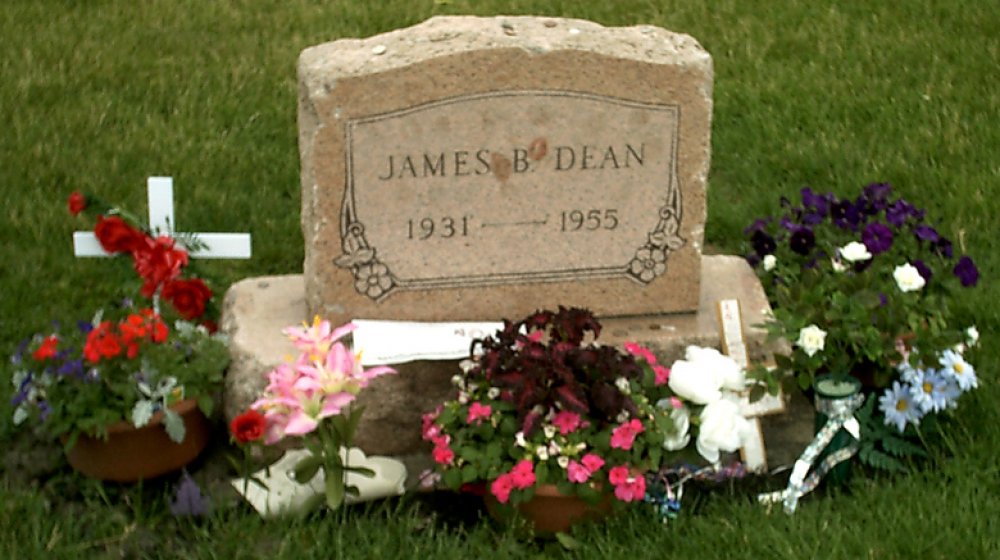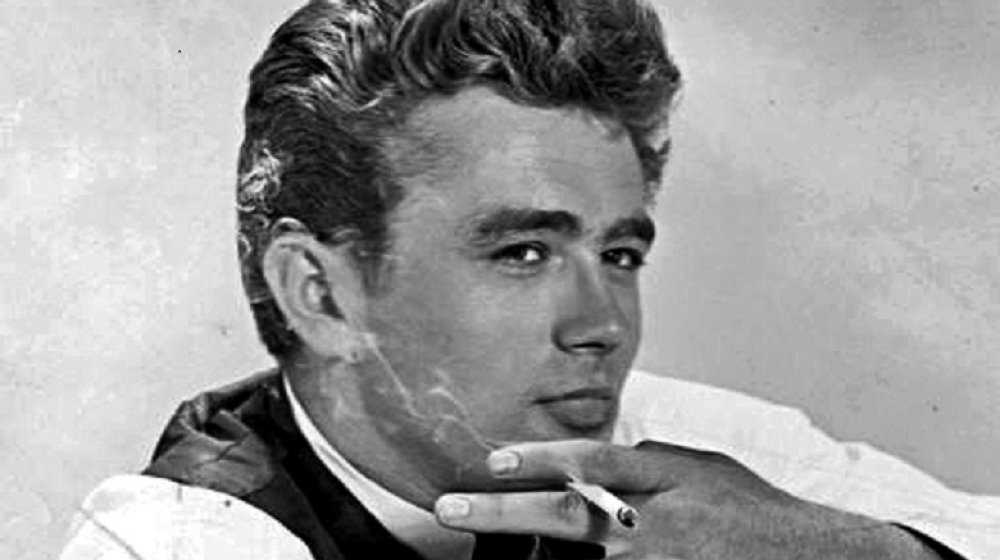The Tragic Real-Life Story Of James Dean
"James Dean, James Dean, I know just what you mean ... And I know my life would look alright, if I could see it on the silver screen." So sang the Eagles about the iconic star-turned-tragic-figure who has been immortalized since his sadly terrible death in 1955. Indeed, Dean has managed to become a larger than life figure, meriting posters, t-shirts, songs, and yes, even a postage stamp. If you've got the cash, you could have all the James Dean memorabilia you could ever want. And it isn't just the Eagles who have paid tribute to the young actor, who was just 24-years-old when he died. The list of tribute songs about or mentioning the man is quite extensive, numbering an impressive 574 tunes more or less according to the definitive YouTube playlist.
From his humble beginnings as a skinny kid in Indiana to the babe of the big screen, James Dean took hold of America in a way most heartthrob wannabes only dreamed about. People ate up stories of his trying childhood with a spoon, cheered his struggles for entertainment stardom, and fell in love with his Hollywood tough-but-tender persona. Little did everyone know how real that struggle was; it was only after he died that America, and the world, really embraced Dean's hard work. This is the tragic real-life story of James Dean.
James Dean was born to a would-be bullfrog farmer
James Dean was born in Marion, Indiana in 1931 to Mildred and Winton Dean. Winton was a dental technician at the local Veterans Hospital, a job he found rather dull. When James was about 3-years-old, the family moved south 10 miles to Fairmount, where Winton decided to take up bullfrog farming, according to biographer David Dalton. These days, says Mother Earth News, raising bullfrogs can be quite profitable. Not so much during the Great Depression, however, when nobody could afford such a restaurant delicacy. The farm failed, and the Deans returned to Marion before deciding on their next adventure by relocating to Santa Monica, California.
The move proved good for little James. Dalton writes that his doting mother made up a "wishing game," wherein the child would write down a wish and put it under his pillow before going to sleep. Mildred would retrieve it during the night and do her best to make the wish come true the next day. She also built little theaters out of cardboard and encouraged play acting using dolls, read poetry to her son, and introduced him to art. According to the Encyclopedia of World Biography, Mildred even enrolled the child in tap dance lessons and taught him to play the violin. He was very close to his mother, who had an obvious influence on his desire to one day be an actor.
'How do you tell an 8-year-old boy his mother is going to die?'
In 1938, Mildred Dean was diagnosed with uterine cancer. According to James Dean 4 Ever, the boy's paternal grandmother hastened to Santa Monica to help care for Mildred. But she died on July 14, 1940. At 9-years-old, James Dean found himself riding a train back to Marion, along with his grandmother and the coffin containing Mildred Dean. Back in school, according to Factinate, he once broke into tears during class, saying he missed his mother. But the move was fine with Winton, who was at a loss as to how to handle Mildred's death. "How do you tell an 8-year-old boy his mother is going to die?" (via James Dean) he said.
Being among family gave Dean time to work through his grief and resume his childhood. "This was a real farm and I worked like crazy when someone was watching me," he later told fellow actress and gossip columnist Hedda Hopper (via Grant County Indiana) "Forty acres of oats made a huge stage and when the audience left, I took a nap and nothing got plowed or harrowed." Meanwhile, the boy worked hard in high school, where he successfully pursued sports and focused on drama classes, graduating in 1949. Next he returned to California, but James Dean 4 Ever verifies that his relationship with his father was strained as the two argued over college pursuits, as well as the young actor's career.
College life for a budding actor
Undaunted by his father's opinions, James Dean changed his major at UCLA to drama. In 1950, the 19-year-old's classmate, James Bella, talked him into being an extra for a Pepsi Cola commercial (via YouTube). It was Dean's first appearance on television. Back at UCLA, he appeared as Malcolm in Macbeth before drama coach James Whitmore advised him to move to New York. There, according to On This Day in Film, Dean was accepted by the Actors Studio under Lee Strasberg. The James Dean website quotes his letter back home as announcing proudly, "I have made great strides in my craft. After months of auditioning, I am very proud to announce that I am a member of the Actors Studio. The greatest school of the theater."
The James Dean website also shows that James Dean had much to say about the joys, and rewards, of acting. "An actor must interpret life," he once explained, "and in order to do so must be willing to accept all the experiences life has to offer. In fact, he must seek out more of life than life puts at his feet." He also exhibited his rebellious behavior, stating that, "When an actor plays a scene exactly the way a director orders, it isn't acting. It's following instructions. Anyone with the physical qualifications can do that. So the director's task is just that – to direct, to point the way. Then the actor takes over."
James Dean was sleeping with sirens of the silver screen
According to the Internet Movie Database, James Dean landed his first role in 1951 as "John" on a Family Theater episode titled "Hill Number One." Three more roles would come his way that year as the actor honed his craft, and a series of similar roles carried his career through the early 1950s. But according to the Express, Dean also became a typical Hollywood playboy, and "would sleep with anybody to get ahead," according to biographer Darwin Porter. Famous women the actor bedded included Joan Crawford, Judy Garland, Marilyn Monroe, and Elizabeth Taylor, all starlets with whom it didn't hurt to be seen with in public. Dean supposedly wanted to marry Monroe, but the actress claimed that doing so would cause the couple "to destroy each other." He also pondered stealing Taylor from husband Michael Wilding, but that too "crashed and burned."
Notably, however, Dean did have one promising relationship with actress Pier Angeli. Cinesuffragette confirms the two met when Dean was filming his first movie, East of Eden, in 1955. The two touted a storybook romance, her gentle charm taming his rebellious nature. It was a delicate balance, especially since Angeli's mother disapproved of Dean, and Dean felt marriage might prove too restraining. When the two separated to work on their respective projects, Angeli began dating singer Vic Damone and eventually announced her engagement to him. Supposedly, Dean sat astride his motorcycle outside the church at the wedding, speeding away as the newlyweds came out afterwards.
Rumors abound that James Dean was gay
Especially after he died, Hollywood's rumor mill began churning out stories that James Dean was gay, or at least bisexual. In truth, at least some of the rumors might have dated back to as early as 1954. That year, Dean played a gay houseboy, Arab, in the play The Immoralist according to History. In an interview with American Legends, writer Hal Hackaday remembered Dean "was not very happy playing the young Arab. He didn't like the plot. I also believe he didn't like playing a homosexual on Broadway. He felt uncomfortable." When asked whether he believed Dean was homosexual, however, Hackaday responded, "I never heard anything like that." And, it should be noted that James Dean's role as Arab was what landed Dean his part in East of Eden.
Biography also acknowledges that Dean's "sexuality has been a matter of debate," and says that some biographers not only question whether he had a physical relationship with Pier Angeli but also believe the actor was bisexual. Writer Kenneth Anger took his thoughts on Dean's sexuality even further, claiming the actor was "kept by an aging TV producer" as he built his career, was into kinky sex, caught crabs while filming Rebel without a Cause, and liked scouting for random partners at a "bondage bar" in east Hollywood. Anger also claimed that Dean told Hedda Hopper that he got out of serving in the military because, Dean said, "I kissed the doc."
The Rebel Without A Cause was nicknamed 'Little Bastard'
James Dean was the epitome of the tortured artist and developed a reputation for moodiness. Real Unexplained Mysteries claimed that due to his rebellious nature, sudden mood swings, and disruptive behavior on the set, Dean became known as the "Little Bastard." JDT Cars attributes this to Bill Hickman, who worked with Dean and fondly called him a little bastard. Dean retorted by calling Hickman a big bastard. Alternatively, according to Dean's close buddies Lew Bracker and Phil Stern, Jack Warner of Warner Bros. called Dean a little bastard for refusing to come out of his trailer while filming East of Eden.
At the time, Dean was developing a taste for speedy little sports cars with hot rod engines under their hoods. Two of them, according to Drive Tribe, were a Triumph Tiger T110 and a Porsche 356, which the actor purchased after filming East of Eden. Warner had forbidden him from racing during filming; in retaliation, when Dean bought his infamous Porsche Spyder 550, he had custom car painter Dean Jeffries emblazon "Little Bastard" on the rear cowling. And, he made sure Warner knew that he fully intended to race the car in between movie obligations for the film studio. American Legends says that Jack Warner later said, "That kid Dean... gave us a lot of trouble, but it was worth it. He was surrounded with stars in Giant, but we believe he was 25 percent responsible for the success of the picture."
Life in the fast lane for James Dean
Giant began filming in May of 1955, after James Dean had already had starring roles in three television shows and another movie, Rebel Without A Cause (per the Internet Movie Database). The money was rolling in. The actor was buying more and more cars and even began racing professionally. The James Dean website verifies that Dean participated in three races: In March 1955 at the Palm Springs Road Race, he took first place in his class and third in the race, but was bumped up to second place when that winner, Ken Miles, was disqualified. Two months later Dean raced at Minter Field in Bakersfield, again placing first in his class and third in the event. And on Memorial Day, he drove four and a half laps before blowing a piston and withdrawing from the race.
As Giant started filming in Marfa, Texas, Dean was forced to give up racing for the duration. Fox News reported that director George Stevens made sure Dean's contract prohibited racing. The studio even took away his company car, claiming he drove it much too fast on the local roads. But that didn't stop Dean from purchasing a Porsche Spyder 550 on September 21. Both actor Alec Guinness and George Stevens warned Dean that he was going to kill somebody with that car. "You can never drive this car on the lot again," Stevens said, according to Shelby Star, "You're gonna kill a carpenter or an actor or somebody."
James Dean's death on a lonely highway, and a curse
George Stevens' demand didn't phase James Dean; on September 30, he set out in his Spyder for another race in Salinas, California. With him was mechanic Rolf Wütherich. All That's Interesting verifies that Dean had already received a speeding ticket when he was cruising down Highway 46 just outside of Cholame. Dean saw another car making a left turn onto the road. "That guy's gotta stop," he told Wütherich, but instead the two vehicles crashed head on. Wütherich was thrown from the car and survived while the other driver, Donald Turnupseed, escaped with minor injuries. Dean, unfortunately, was trapped in the car as it spun in the air before hitting the ground. He was pronounced dead upon arrival at Paso Robles War Memorial Hospital, and is buried in his home state of Indiana.
In the aftermath of the accident, Dean's Spyder was briefly put on display before generating a series of stories about a curse that even Snopes can't explain. The tales mostly center on parts of the Spyder, which when installed in other vehicles resulted in injuries and deaths of the owners. The car itself was in transit when it mysteriously disappeared in 1960—but a Fox Sports report in 2015 identified a man, Shawn Reilly, who believed his father and others, including Batmobile creator George Barris, hid the car away in Washington state. And although Barris later maintained he owned the vehicle, its whereabouts have remained unknown since he died that same year.
James Dean missed out on his posthumous fame
Sadly the worst part about James Dean's death is that it made him even more famous. For starters, he received best actor Oscar nominations (but did not win) in 1955 and 1956 for his roles in East of Eden and Giant. And, since 1957, a whopping 23 books and 14 movies have been made about the actor, according to Internet Movie Database—and that doesn't count the times the icon has been portrayed in other films. On an important social front, the Chicago Tribune maintains, Dean dared to defy the world with his rebel roles. This was in a time when America was still reeling from the Great Depression and World War II, and was pursuing a more wholesome image.
Dean's persona has remained in the limelight for over 60 years. In 1996 he was remembered on a United States postage stamp. And even today, his hometown of Marion, Indiana celebrates his life each September with a car show, a James look-alike contest, and a 50's dance contest, even a pet parade and a 5K run—and of course a showing of Dean's movies. For those who miss the event, author Chris Epting writes that visitors to Marion also can check out the memorial in front of his former childhood home. The place no longer stands, but the nearby Fairmount Historical Museum displays the pants Dean wore on Giant, as well as the speeding ticket he received the day he died.
